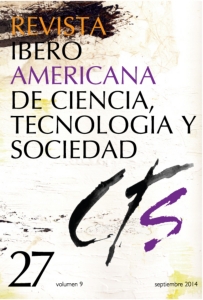Citizen science in the Information Society
New world trends
DOI:
https://doi.org/10.52712/issn.1850-0013-577Keywords:
citizen science, empowerment, ICTsAbstract
The E-Citizen Science (eCS), also known as “e-science”, is the new term applied to the participation of laymen in scientific projects, a practice that has been expanded into the 21st century by the use of information and communication technologies (ICTs). The eCS has developed rapidly in the last two decades. The most recent developments are due to the sum of new scientific approaches and the use of ICTs. The eCS includes a variety of applications, from agriculture to urban planning, from public health to oceanography, from social sciences to software and services, and to space engineering. This work, based on a research conducted for UNESCO in 2012, focuses on some of the global trends in the use of ICTs in participatory scientific projects. It analyzes the role of citizen scientists in eCS projects, reveals a shortage of projects to gender studies, notices that the use of eCS empowers communities, and finally stresses the importance of public policies on science and technology in the development of eCS. This paper does not attempt to capture all of these trends. Instead, it proposes to pay attention to the most essential and relevant sources of information and areas of debate.
Downloads
References
BONNEY, R., COOPER, C. B., DICKINSON, J., KELLING, S., PHILLIPS, T., ROSENBERG, K. V., y SHIRK, J. (2009): “Citizen Science: A Developing Tool for Expanding Science Knowledge and Scientific Literacy”, BioScience, nº 59, p. 11.
BONNEY, R., BALLARD, H., JORDAN, R., MC CALLIE, E., PHILLIPS, T., SHIRK, J. y WILDERMAN, C. C. (2009b): “Public Participation in Scientific Research: Defining the Field and Assessing Its Potential for Informal Science Education. A CAISE Inquiry Group Report”, Center for Advancement of Informal Science Education (CAISE), Washington DC, Tech. Rep.
BROSSARD, D., LEWENSTEIN, B. y BONNEY, R. (2005): “Scientific Knowledge and Attitude Change: The Impact of a Citizen Science Project”, International Journal of Science Education, vol. 27, nº 9, pp. 1099-1121.
CANCIAN, F. M. (1992): “Feminist science: Methodologies that Challenge Inequality”, Gender & Society, vol. 6, n° 4, pp. 623-642.
CAVALIER, D. (2008): “Harnessing Citizen Scientists. Let’s Create a Very Public Office of Technology Assessment”, Science Progress.
COOPER, C. (2012): “Victorian-Era Citizen Science: Reports of Its Death Have Been Greatly Exaggerated”, Scientific American.
DIAS SOARES, M. l. (2011): “Employing citizen science to label polygons of segmented images”, doctorado de tesis en el Post Graduation Course in Applied Computing, Instituto Nacional de Pesquisas Espaciais - INPE, Servico de Informacao e Documentacao (SID), Sao José dos Campos,Sao Paulo, Brasil.
ELLUL, C., HAKLAY, L. y FRANCIS, M. (2008): “Empowering Individuals and Community Groups – is Web GIS the Way Forward?”, AGI GeoCommunity ’08, Stratford-upon-Avon, Reino Unido.
EUROPEAN UNION (2010): “Riding the wave. How Europe can gain from the rising tide of scientific data”, Bruselas.
INTERNATIONAL COUNCIL FOR SCIENCE AND THE UNESCO (2002): “Science, Traditional Knowledge and Sustainable Development”, ICSU Series on Science for Sustainable Development, nº 4.
HAKLAY, M. (2012): “Citizen Science and Volunteered Geographic Information – overview and typology of participation”, en: D. Sui, S. Elwood y M. Goodchild (eds.): Volunteered Geographic Information, Public Participation, and Crowdsourced Production of Geographic Knowledge, Berlin, Springer.
HAND, E. (2010): “Citizen science: People power”, Nature, vol. 466, nº 7307, pp. 685–687.
HILL, C., CORBETT, C. y ST ROSE, A. (2010): Why So Few? Women in Science, Technology, Engineering, and Mathematics, Washington DC.
KUMAR, R., CHOU, C. T., KANHERE, S., BULUSU, N. y HU, W. (s/f): “Ear-Phone: An End-to-End Participatory Urban Noise Mapping System”, School of Computer Science and Engineering, University of New South Wales, Sydney, Australia and Department of Computer Science, Portland State University.
LEWENSTEIN, B. V. (2004): “What does citizen science accomplish?”, CNRS colloquium, Paris.
LIEBENBERG, L., BLAKE, E., STEVENTON, L., BENADIE, K. y MINYE, J. (1998): “Integrating Traditional Knowledge with Computer Science for the Conservation of Biodiversity”, CHAGS, Kyoto.
OPEN SCIENTIST (2011): Finalizing a Definition of “Citizen Science” and “Citizen Scientists”. Disponible en: http://www.openscientist.org/2011/09/finalizing-definition- of-citizen.html.
SUI, D., ELWOOD, S. y GOODCHILD, M. (2012): Volunteered Geographic Information, Public Participation, and Crowdsourced Production of Geographic Knowledge, Berlin, Springer.
TAEB, M. (2005): Revisiting Women’s Participation in Science and Technology. Emerging challenges and Agenda for Reform, UNU-IAS Report.
UNESCO (2006): “UNESCO and Indigenous Peoples: partnership to promote cultural diversity”. Disponible en: athttp://unesdoc.uneCSo.org/images/0013/001356/135656M.pdf.
UNESCO, PRECED (2003): “Protection des Ressources Culturelles des Pygmées du Gabon et leur intégration dans le processus de développement”. Disponible en: http://unesdoc.uneCSo.org/images/0015/001591/159172f.pdf.
WHELAN, J. (2006): “Community decision-making and empowerment: findings from six years of Citizen Science research”, Cooperative Research Centre for Coastal Zone, Estuary and Waterway Management, Griffith University’s Faculty of Environmental Sciences, Conference proceedings: Coast to Coast – Australia’s national coastal conference.
WIGGINS, A. y CROWSTON, K. (2012): “Goals and Tasks: Two Typologies of Citizen Science Projects”, School of Information Studies, Syracuse University.
WSIS (2005): Tunis agenda for the information society.
WSIS-UNESCO (2006): Multi-Stakeholders Consultation Meeting on “E-Science” (Action Line C7), Beijing.
UNITED NATIONS DEVELOPMENT PROGRAMME (2012): “Mobile Technologies and eMpowerMenT: enhancing human development through participation and innovation”, Nueva York.
Downloads
Published
How to Cite
Issue
Section
License
Copyright (c) 2024 CC Attribution 4.0

This work is licensed under a Creative Commons Attribution 4.0 International License.
All CTS's issues and academic articles are under a CC-BY license.
Since 2007, CTS has provided open and free access to all its contents, including the complete archive of its quarterly edition and the different products presented in its electronic platform. This decision is based on the belief that offering free access to published materials helps to build a greater and better exchange of knowledge.
In turn, for the quarterly edition, CTS allows institutional and thematic repositories, as well as personal web pages, to self-archive articles in their post-print or editorial version, immediately after the publication of the final version of each issue and under the condition that a link to the original source will be incorporated into the self-archive.











